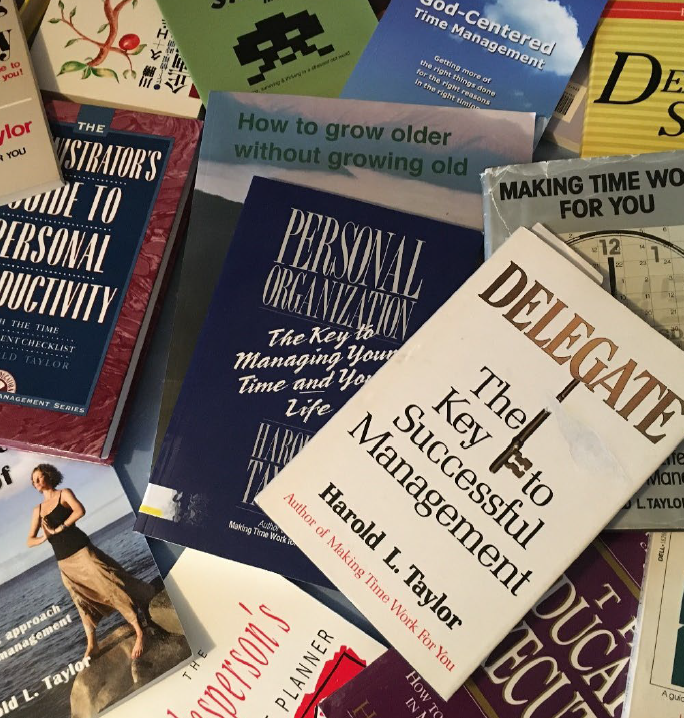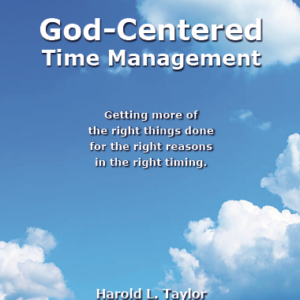Description
TIMELY DEVOTIONALS – For time-challenged Christians
(PDF Book).
A companion book for the award-winning God-Centered Time Management book, this 102-page devotional book can be used independently, and covers many of the same time management topics.
Available for immediate download in PDF format
SAMPLE:
Table of Contents
1 Manage your time. / 7
1.1 Working is a form of worship.
1.2 Leading a productive life.
1.3 Time flies. But God is the navigator.
1.4 Are you managing your time?
1.5 One day at a time.
1.6 We worship a God of order.
2 Timely choices. / 16
2.1 Clock time and god’s timing
2.2 Determining your priorities.
2.3 Choose the main thing.
2.4 Make the main thing the main thing.
2.5 Glorifying God through our actions.
3 Work effectively. / 26
3.1 Finish what you start.
3.2 Be proactive.
3.3 Know your purpose.
3.4 Don’t be idle during “idle time.”
3.5 Know when to say no.
3.6 Form good habits.
4 Develop self-discipline. /35
4.1 Self-control is the key to achievement.
4.2 Keep in step with the Spirit.
4.3 Study God’s mirror.
4.4 Multitasking reduces self-control.
4.5 Step out of the boat.
4.6 Wherever you are, be there.
5 Get rid of your “stuff.” / 44
5.1 A modern-day parable.
5.2 Garage sale? what would Jesus do?
5.3 How to store up treasures in heaven.
5.4 Pondering possessions and people.
5.5 The best thing in life is free.
5.6 Everything in moderation – except gratitude to God.
6 Hurry up and slow down! / 53
6.1 Does hurry determine your priority?
6.2 Hurry creates stress.
6.3 Jesus was never in a hurry.
6.4 I don’t have time for patience.
6.5 Your bible or your smartphone?
6.6 Will we find the time or find an excuse?
7 The importance of doing nothing. / 62
7.1 Observe the Sabbath.
7.2 Your body is the temple of the holy spirit.
7.3 There is a time for everything – including sleep.
7.4 Follow god’s timing.
7.5 How your circadian rhythm works.
7.6 Where is your quiet place?
8 Common time wasters. / 71
8.1 The misuse of words.
8.2 Anger is only one letter short of danger.
8.3 Don’t try to do a perfect job when a perfectly good job will do.
8.4 Unity is not the same as uniformity.
8.5 The fear of missing out.
8.6 Are your postings boasting?
9 Wage war on worry. / 80
9.1 Worry is not a good use of time.
9.2 Don’t be in a hurry to worry.
9.3 The peace of God.
9.4 Having problems? reframe it.
9.5 In the loving arms of God.
10 Take time to be grateful and give thanks. / 88
10.1 Give thanks with a grateful heart.
10.2 Being thankful is not enough.
10.3 True thankfulness leads to gratitude.
10.4 An attitude of gratitude.
10.5 Gratitude is not just for good times
10.6 Thank God for the little things in life.
Epilogue / 97
Bibliography / 99
About the author / 101
Introduction
For over a year and a half, I have been writing two or more devotionals each week for our local Baptist Church. Since my lifetime career has been a consultant, speaker, and seminar leader on the topic of time management, many of my devotionals were focused on that topic.
In addition, during the same period, I was working on a book, “God-Centered Time Management,” which in turn inspired many of my devotionals.
So, I thought it would be appropriate to select those devotionals that involved the management of time and produce this devotional book, “Timely Devotions for Time-Conscious Christians.” I thought it might make an appropriate companion for the book or as a separate devotional for my many Christian friends and others.
So here it is. I hope you like it – and are blessed by it.
Chapter 1
Manage your time.
1.1 Working is a form of worship.
“Whatever you do, work at it with all your heart, as working for the Lord, not for human masters, since you know that you will receive an inheritance from the Lord as a reward. It is the Lord Christ you are serving.” (Colossians 3:23-24)
Situation
God created us in his own image, blessed us, and told us to fill the Earth, subdue it, and have dominion over it. God created everything from nothing, and he called it “very good.” (See Genesis 1:27-31) He created the raw materials for us to follow His example. So, we should be busy and creative and discover ways to keep his creation beautiful and bountiful and further improve life for one another on this Earth. (See Philippians 2:3-4.) By doing so, we please, honor, and worship Him. Worship is not just something you do inside the church. Although growing in Jesus also includes things like volunteering at church, reading God’s word, meeting together, and praying.
God placed Adam in the Garden of Eden, with the instruction “to work it and take care of it,” (Genesis 2:15) This was before the curse, and work was not a punishment inflicted on Adam for his sin, but a part of God’s original plan. The word for “work” literally means “to prepare” or “to develop.”
But we should not develop sub-standard products. Instead, whatever we do, should be done in the name of Jesus. giving thanks to God the Father through Him. (Colossians 3:17) We must devote ourselves to doing good and being productive. And to be productive, we must manage our time well. We can do this through whatever work we have been called to do. (Titus 3:14)
Application
So, whether a farmer, carpenter, shopkeeper, pastor, writer, or whatever, you can fulfill God’s purpose for your life by doing your job well. You may receive compensation from others for doing it; but your real reward will come from God Himself, when he says, “Well done, my good servant,” as spoken in Luke: 19:17.
Response
Are you productive? Are you creative? Have you strived for excellence in your work? Are you working to serve others? Have you gone that extra mile in your journey with Jesus? I think all Christians should be able to say after having spent a lifetime on this Earth, that something is a little better because of their having been here.
1.2 Leading a productive life.
“What good is it, my brothers, if a man claims to have faith but has no deeds? Can such faith save him?” (James 2:14)
Situation
The most important day of our life is today. You can’t do anything about yesterday nor can you do anything right now about tomorrow. But today is yours to use as you wish. Titus 3:14 tells us not to lead unproductive lives. And 1 John 2:17 tells us, “The world and its desires pass away, but the man who does the will of God lives forever.”
How then should we start our day? By doing good works? Is that what James is telling us in our opening scripture reference, James 2:14? No, he is simply saying that good works are the evidence of salvation, not the source of it. If we have true faith, and not just a “repeat after me” mindless statement that we are inviting Christ into our lives, then good works will naturally result. He is saying that if we don’t do good works, our faith can’t be genuine. Because Romans 10:9-10 says, “That if you confess with your mouth, Jesus is Lord, and believe in your heart that God raised him from the dead, you will be saved. For it is with your heart that you believe and are justified, and it is with your mouth that you confess and are saved.” And “We are created in Christ Jesus to do good works, which God prepared in advance for us to do.” (Ephesians 2:10)
Application
I believe we should start the day with God. Perhaps by rejoicing that we have another God-given day ahead of us. (Psalm 118:24) Perhaps thanking him for our salvation and assuring him of our heart commitment. And we could pray for whomever the Holy Spirit brings to mind. And yes, then we could do good works, which don’t necessarily involve physical work. It could be specific prayers for missionaries, sending an email or two of encouragement to others, calling an ailing brother or sister in Christ, or whatever. It might involve attending a Bible study, volunteering at a food bank, driving someone to the hospital, visiting a friend, participating in an ongoing ministry, sharing your testimony with a friend or neighbor, or any number of things mentioned in the Bible.
Response
Be open to the Lord’s leading and then plan each day. (Proverbs 16:9) Tomorrow you have a new day to continue with your productive life. As the sun sets today, let’s plan what we will do tomorrow. Keeping in mind what CT Studd expressed so well, “Only one life, twill soon be past, only what’s done for Christ will last.”
1.3 Time flies. But God is the navigator.
“Teach us to number our days aright, that we may gain a heart of wisdom.” (Psalm 90:12)
Situation
As Warren Wiersbe mentioned in his book on James, titled Be Mature, we tend to count our years at each birthday, but God tells us to number our days. (Psalm 90:12) Unfortunately, many of us only realize the wisdom of this when we are older, when the years seem to pass so quickly, and we have fewer days left to squander.
As I contemplate yet another birthday, I feel I have accomplished quite a lot in my 88 years. But when I consider the days, as God appears to tell us, I realize that much of my time has been wasted. Especially when I think of the hours squandered on TV, social media, computer games, and so on.
If I had used only 3 extra minutes each day for the last 40 years to do something else for Christ, such as call a church member, pray for a friend, share my testimony, offer a word of encouragement to someone, and so on, the total time spent would have amounted to 730 hours. Only 3 minutes a day! And, who knows what I could have accomplished for Christ if God had also blessed those 730 hours.
As an analogy, consider what mathematicians tell us would happen if we folded a hypothetical massive piece of thin bible paper 40 times. It would reach the Moon! This is the power of exponential multiplication and might be an indication of what God could do with only 3 minutes a day.
Dr. J. Oswald Sanders suggested in his book, A Spiritual Clinic, “Stop leaks. Let us not consider our day only in terms of hours but in smaller areas of time. If we look after the minutes, the hours will look after themselves.”
Application
I realize that we are all doing something to further the work of Christ, or we would not be Christians. But who of us could not have spared an extra 3 minutes a day? Let me be the first to admit that I did not make the best use of each day. But praise God, as I write this, I am still alive, and still able to make better use of my time. (Ephes. 5:15-17)
Response
Are you happy with how you are using each day? If not, ask God for guidance. Plan your day but be prepared to let God determine your steps. (Proverbs 16:9)
1.4 Are you managing your time?
“Be very careful, then, how you live—not as unwise but as wise, making the most of every opportunity, because the days are evil. Therefore, do not be foolish, but understand what the Lord’s will is.” (Ephesians 5:15-17)
Situation
In Ephesians, Paul urges us to manage our time. If the cost and value of anything is determined by supply and demand, the value of my time must be astronomical! That’s based on age only, not worth. As we grow older, our time here on earth increases in value. Yet many elderly people think the opposite. They feel that once they retire, and their income decreases, their value decreases. This couldn’t be further from the truth. Each God-given hour is precious and must be used accordingly.
In time management jargon, one of the key principles or laws of making the best use of our time is the 80/20 Rule, or Pareto Principle, which basically states that 20% of the things we do provide 80% of the value, benefits, or results. The application of this rule involves deciding what are the most important results of your various activities and spending more of your time on them. And spending less time on other things. For example, in business, if most of your sales are derived from direct mail, and yet most of your time, money, and effort is being used on ads, postings, articles etc. on social media, how you are spending this time, money, and effort should be changed. (This assumes that income is one of the most important goals of your business.)
Application
To apply this to your personal life, you must decide what is most important to you at this stage of your life. Increasing your income or investments? Traveling, watching TV, or spending time on social media? Building personal relationships? Getting to know God better, becoming more Christlike, and following Jesus? Or something else? Then look at the amount of time, effort, and money you are investing in those activities that you feel are producing the results you value most. Then make changes accordingly.
Response
Only you can make that decision because we all have our own priorities, abilities, and opportunities at the stage of life that we are at now. Personally, I find that things like money, travel, business interests, and so on are decreasing in value, and I am becoming more aware of the phenomenal value of knowing God better and becoming more Christlike. This means I must spend more time reading the Bible, studying Scripture, connecting with God in personal prayer, and less time on those less important things. I have already made the decision to post my business articles monthly, instead of biweekly to free up time. I think the time spent on social media will be the next adjustment. What decisions have you made recently on how you are using your time?
1.5 One day at a time.
“Because of the LORD’s great love we are not consumed, for his compassions never fail.
They are new every morning; great your faithfulness.” (Lamentations 3:22-23)
Situation
I love the hymn that says, “Lord for my sake, teach me to take one day at a time.” We tend to measure our lives in years, making New Year’s resolutions, celebrating birthdays, setting annual goals, and worrying about all the things we must do. It is exhausting just thinking about it.
But God measures our lives in days, regardless of our age. And he promises the strength we need for each day. (Deuteronomy 33: 25) Apostle Paul tells us we are being renewed every day. (2 Corinthians 4: 16.) And Jesus tells us to take up our cross daily. (Luke 9: 23.)
God allots our work in one-day increments. And that’s all we can handle. As we pray the Lord’s prayer, we are asking Him to give us our daily bread – for the strength that we need each day. (Matthew 6: 90-13)
Application
Have you noticed that by the time you go to bed at night, you frequently feel weighted down with problems, fears, worries, or things that must be done the next day? But by morning, the load seems a lot lighter. That’s because God provides us with sleep and renewed energy, and the peace that surpasses all understanding. You receive his peace by abiding in Christ.
As Robert J Morgan says in his book, The Strength You Need, “Every morning it’s like we’re connecting our 40-Watt lives to the nuclear reactor of the very personality of God.” He quotes a poem By Annie Johnson Flint that appeared on a postcard.
“When we have exhausted our store of endurance,
When our strength has failed ere the day is half done,
When we reach the end of our hoarded resources,
Our Father’s full giving is only begun.
His love has no limit; his grace has no measure.
His power has no boundary known unto men;
For out of His infinite riches in Jesus,
He giveth, and giveth, and giveth again.”
Response
As I grew older, I used to worry about the future – what would happen to me, my children, my grandchildren, and so on. But I have learned over the years that God has my future covered. As explained in the hymn, He only expects me to take one day at a time. And each day, He gives me all the strength I need to do what He has given me to do that day. As you take hold of each day, you take hold of the promises of God.
1.6 We worship a God of order.
“For God is not a God of disorder but of peace—as in all the congregations of the Lord’s people.” (1 Corinthians 14:33)
“But everything should be done in a fitting and orderly way.” (1 Corinthians 14:40)
Situation
We worship a God of order and purpose who designed this Earth in perfect harmony and balance. We know that God is a God of order and purpose, and as Christians, we can also strive to put order into our surroundings and routines that help us be more efficient, effective, and purposeful.
As Angie Hyche mentions in her book, Unholy Mess, “Creation is the supreme example of an ordered process. God didn’t just haphazardly speak everything into existence.” To see examples of God’s orderliness you need only look at His creation. Look heavenward and see how the stars are aligned, look through an electron microscope and see how the molecules and atoms are aligned, and look at the human body and how it functions. Scientists now tell us that the brain includes about 100 billion nerve cells called neurons and at least 100 trillion synapses, or connections between neurons. That is about 1000 times greater than the number of stars in our galaxy!
To quote Robert Gordon, in his book, Mastering Life Before It’s Too Late, “The concept of organization is built into the very fabric of the universe – from this design of a spider’s web to the arrangement of stellar systems. Whether you study a human cell and a microscope, or the milky way through a telescope, you find concordance and congruity. You see coordination. All creation reflects the genius of a mind of order and infinite intelligence.”
Application
Paul is telling us in 1 Corinthians 14:33 that God is not the author of confusion but is a God of order and harmony, and all His children within the Church, should reflect this godly characteristic. It is a reminder to us that disorderly behavior is dishonoring to the Lord and contradictory to His ways.
Response
It doesn’t simply mean we should be neat and tidy, although I believe that is a part of it. But if we are to reflect God’s character, then our services, worshipping, business meetings, outreach programs, businesses, and everything we do, should be, as indicated in 1 Corinthians 14:40, “conducted in a fitting and orderly way.” And of course, this applies to our personal lives as well.
Something to think about.
For the complete book please purchase a copy




